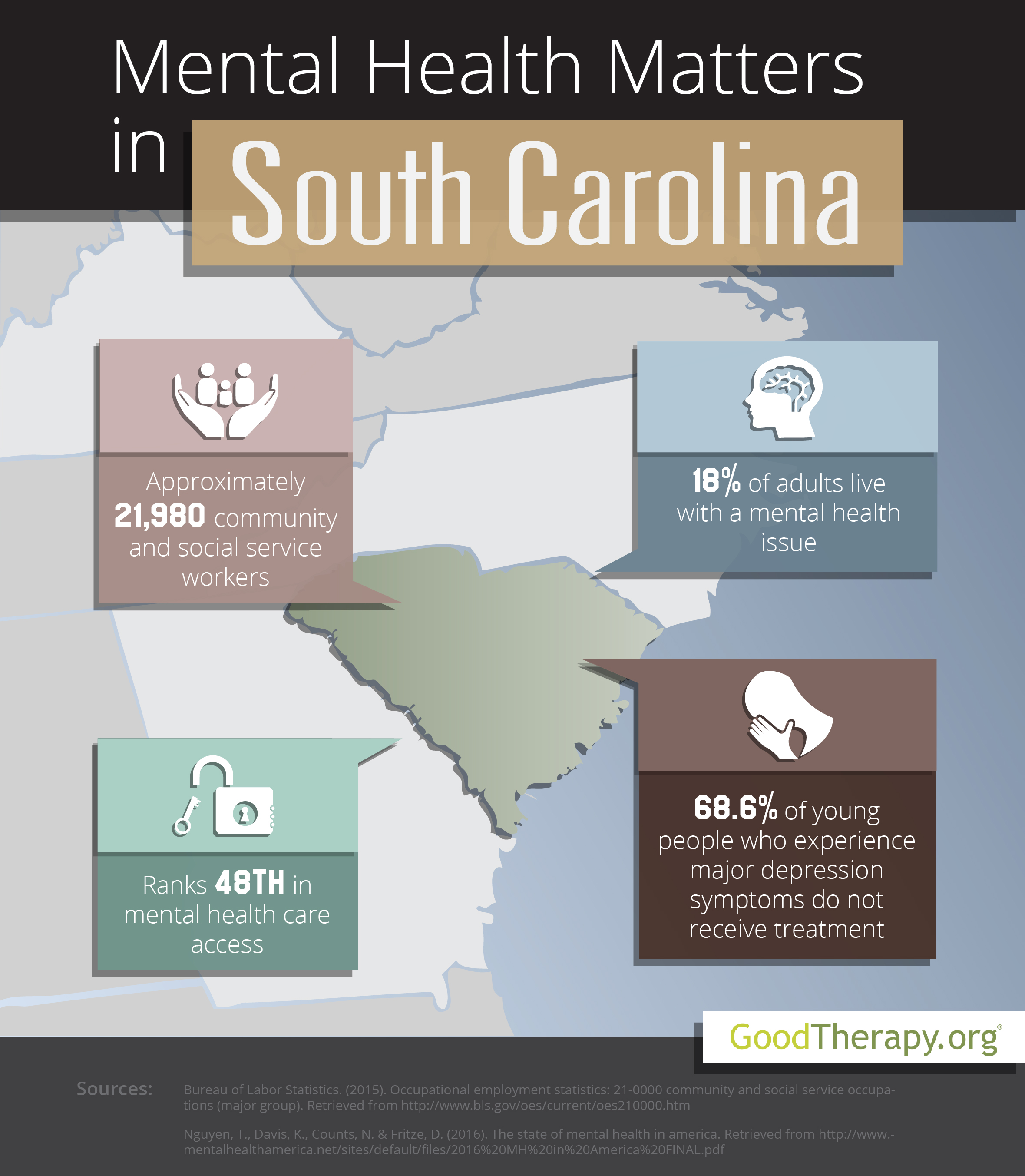Find a Therapist in South Carolina
Welcome to the South Carolina therapist directory at GoodTherapy.org. Our directory is the fastest and safest way to find a good counselor or therapist in South Carolina cities. We only include professional therapists, counselors, and psychologists whose work accords, in attitude and orientation, to the elements of good therapy. Find a therapist or counselor in your South Carolina zip code, or click on the links below to see the counselors in your city. If you are looking for telehealth therapy you can click here to see all South Carolina telehealth therapists.
Beaufort County
Charleston County
Greenville County
Horry County
Lexington County
Richland County
Spartanburg County
Mental Health Matters in South Carolina
Nearly 4.9 million people lived in South Carolina in 2015, as reported by the United States Census Bureau. Census data states 68.4% of the population is white, 27.9% is black, and 1.6% is Asian. About 22.3% of all residents are under the age of 18, while 16.2% are age 65 or older. Approximately 51.4% of the population is female.
Approximately 21,980 South Carolina residents worked in community assistance and social service fields in 2015, earning an average salary of about $40,000.
 Mental Health in South Carolina
Mental Health in South Carolina
In 2016, Mental Health America (MHA) compared all states and the District of Columbia for current mental and behavioral health standards. After the survey was completed, the state of South Carolina was 38th in adult ranking, 43rd in youth ranking, 23rd in prevalence of adverse mental and behavioral health issues, and 48th in access to mental health care. Researchers who conducted the survey and some therapists in South Carolina believe the state’s low access to care ranking correlates with several local socioeconomic features such as low rates of graduation for students with disabilities, and high rates of unemployment, obesity, violent crime, and poverty. South Carolina received an overall mental health rank of 38th, placing in the lower half of the list.
Mental health issues affected a little more than 18% of the adult population in South Carolina. Approximately 8.2% of people in the state have substance abuse issues, and 4% have had serious thoughts of suicide. Among the younger population, 5.7% use drugs or alcohol, while 7.4% have severe depression symptoms.
Residents in need of care may experience some barriers to receiving treatment. The state was ranked 38th in mental health workforce availability, with a ratio of 702 residents to each mental health provider or therapist. In South Carolina, 30.2% of adults with mental health issues have no mental health coverage, and 31.6% of adults with a disability could not afford the cost of treatment. In 2016, the state was ranked 42nd for children with private insurance that does not provide mental health coverage, and 46th for young people with severe major depression symptoms who did not receive treatment. According to a 2014 report from the Substance Abuse and Mental Health Services Administration (SAMHSA), 59.7% of teenagers in South Carolina report improved functioning after receiving treatment from the public mental health system—a figure lower than the national average of 69.3%.
References:
-
Bureau of Labor Statistics. (2015). Occupational employment statistics: 21-0000 community and social service occupations (major group). Retrieved from http://www.bls.gov/oes/current/oes210000.htm
-
Nguyen, T., Davis, K., Counts, N. & Fritze, D. (2016). The state of mental health in America. Retrieved from http://www.mentalhealthamerica.net/sites/default/files/2016%20MH%20in%20America%20FINAL.pdf
-
Substance Abuse and Mental Health Services Administration. (2014). Behavioral health barometer: South carolina, 2014. Retrieved from http://www.samhsa.gov/data/sites/default/files/State_BHBarometers_2014_2/BHBarometer-SC.pdf
-
United States Census Bureau. (2015). Quick facts: South Carolina. Retrieved from https://www.census.gov/quickfacts/table/PST045215/45
Advanced Search | Browse Locations | International Search